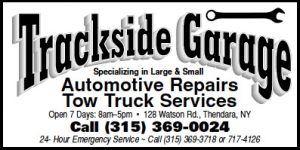Does zoning make things pretty? Consider the following…
Zoning & Aesthetics
Not too long ago, this office received an anonymous letter from a disgruntled property owner who was clearly upset with a property in their neighborhood.
Attached to the letter was a photograph of a sign along Route 28 that said “Town of Webb—Zoning Enforced.”
In the photo, the sign was circled clearly to indicate their conclusion that the sign was misleading because obviously zoning is not enforced.
The issue was about the appearance of a particular property.
An occasional pile of boards or scrap framing-lumber, boats and trailers come and go, a pile of dirt shows up, then a month later things disappear…
Five or more lawn mowers are stored outside, a couple old charcoal grills next to the building; pickup trucks are parked for different periods of time and are usually registered.
There may be other things that appear, and then disappear.
The letter asks if the building could be painted to look better.Being an anonymous letter, it is impossible to have a discussion with the concerned citizen regarding all the issues at hand.
Because someone has five lawn mowers outside, does this constitute a zoning violation?
Does a pile of boards outside constitute a zoning violation?
What about a building needing a paint job or fresh stain, is that a violation?
Parking a boat on a trailer, is that a violation?
What about having an unlicensed vehicle parked next to the building, is that another violation?
The concept of zoning has been around for many, many years. Nationally and state-wide, well over one-hundred years.
Locally here, in the Town of Webb, since 1965, which now is quickly approaching fifty years.
Zoning can regulate many things, and actually does.
Use of property, subdivisions, development standards, signage, density standards and locations of buildings are some examples.
Along with any zoning ordinance comes zoning classification maps.
These maps will delineate areas, or zoning districts, which spell out the allowable or prohibited uses and activities within each district.
Some examples of these uses are residential single family, two family, multiple family, retail, retail based on size or type, professional office, service garage, gas station, wood shops, industrial buildings, restaurants, bars and nightclubs, doctor’s offices, veterinarian office, lumber yards, storage facilities, amusement parks, camp grounds…
There are so many potential uses, it is impossible to list them all.
After all the regulatory stuff that comes with a zoning ordinance, can zoning make a property look “good?”
Maybe it can help, but looking good or disheveled may have no bearing on whether or not a property is in direct contradiction with the zoning ordinance.
The property in question is located in a commercially zoned district. There are commercial and business uses all around.
Although for awhile the construction debris got rather voluminous, the owner did clean that up.
Now it is the occasional pickup truck load of unused boards that gets piled and then taken somewhere else.
There is always one unlicensed vehicle on site. Unlicensed motor vehicles are only prohibited in residential zones.
 Having five lawn mowers outside is not prohibited by zoning.
Having five lawn mowers outside is not prohibited by zoning.
Having lots of stuff around does not necessarily constitute a zoning violation. Most zoning ordinances will prohibit a “junk yard.” Not every ordinance clearly defines what a junk yard is.
A structure in need of stain does not necessarily constitute a violation either. It may not look as good as someone else may like it.
No doubt, certain situations do rise to enforcement action relative to property maintenance.
Life safety, health, sanitary issues are among the most common.
Zoning may not make things look pretty.
 The zoning ordinance is a comprehensive document that covers many things.
The zoning ordinance is a comprehensive document that covers many things.
Property maintenance is a small part of the overall document.
And by the way, this property is monitored, maybe not every day. When this office does contact the owner they do respond without arguing whether or not he is in violation.
Knowledge, understanding, voluntary cooperation and pride in your property and community make any zoning law work well.
